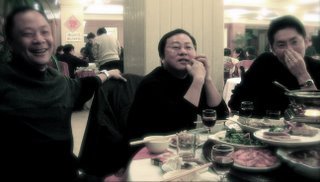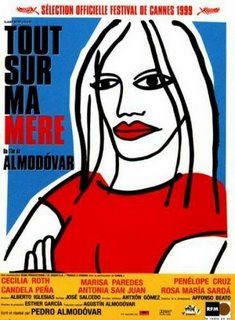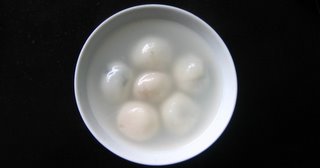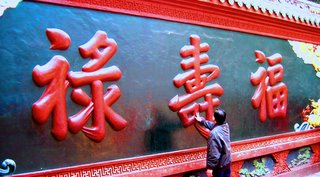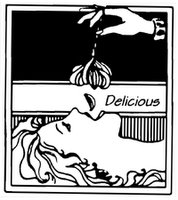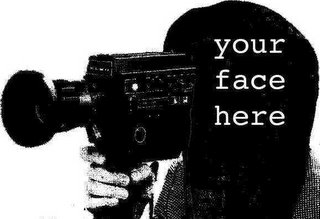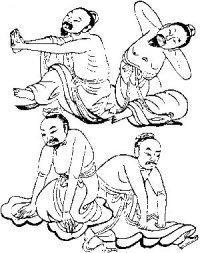
My friend Lynn, an American reporter based in Beijing, introduced me to two Qi Gong master friends of hers at her Christmas party. “You really believe that?” I asked her quietly in the kitchen after the introduction. “Yeah.” She replied with the usual enthusiasm, “Last time when Mr. Liang used his Qi on me, I felt a strong force pushing me. Her wife over there,” she pointed at a plain-looking middle-aged woman with long plaited hair, “is supposed to be an even more powerful master.”
I was reluctant to buy into her enthusiasm. I had my experience with Qi Gong in 1986 when I was in junior high. Qi Gong is this Chinese breathing exercise developed from Taoist and Buddhist traditions to improve Qi, the vital energy that moves our body and the universe. Depending on the school of Qi Gong you follow, the practice promises better health, magic cure for sickness or the ultimate path – eternal life in some faraway dream land.
The early and mid 80s in China was a time of rapid opening up and eager absorption of Eastern and Western knowledge. Freud’s dream analysis, Zen comic books, UFO sightings, supernatural power in humans, and Qi Gong were among the many trends that captivated the entire country one time or another. Qi Gong masters would tour the country giving talks to packed auditoriums. Thousands and thousands in the audience would be induced into a state of mass hysteria (or euphoria). Many felt the strong Qi from the masters. There would be bawling, screaming, and reputedly instant cure of the incurable. Many became devout followers.
In my parents’ work unit more and more people were practicing Qi Gong in the morning. Some would be standing still in front of trees, some walking, some yelling into the sky, per instructions of the different schools of practice, and all involving some repetitive movements of the limbs as the body undulate with the Qi. My parents were among the few who are too negative to believe in anything. The only time I remember them mentioning Qi Gong was when a colleague of theirs started practicing Qi Gong after having been diagnosed with colon cancer.
The colleague died two months later, after trying all of the popular Qi Gong schools.
As a teenager, I was curious about all the hype and wanted to experience the magic Qi. So when a Qi Gong master came to our neighborhood to set up a seminar, I went.
I remember the seminar was at a local school, in a small classroom warmly lit and full of uncles and aunties from the work unit. The master started explaining Qi Gong by citing the Chinese classic fantasy novels, especially my favorite, Journey to The West. According to him, all the deities in that book were simply Qi Gong masters who had attained eternal life and magic powers through practice. “Do you know why Lao Tse in that book has a greenish light in the cloud he rides? That’s the color of Qi of the highest level.” He exclaimed. All the uncles and aunties nodded in utter deference. The fictional account of a Monkey King’s adventure to India apparently had very materialistic basis and represented the highest form of our Chinese civilization.
To further prove the power of Qi, the whole class meditated in silence, with the two palms closed facing each other in front of the chests. We were instructed to pray for the middle fingers of our right hands to grow longer. After a minute, as people slowly got out of the meditation, sporadic wows and ahs erupted in the room - the middle fingers of the right hands indeed looked longer than the left ones!
After demonstrating this remarkable feat to my classmates for a few times, I forgot about Qi Gong. The celebrity masters slowly went out of fashion – some went overseas, some arrested for fraud or political reasons (depending on whom one listens to). The country got caught up in heated political discussions in 1989. I got caught up in the TOEFL and GRE and went to America. While in the States, I heard Falun Gong, a new school of Qi Gong practice, became hugely popular and the government cracked down on it. One of my university friend, now an established professor at an US university, got black-listed by the government after he presided over a local chapter of Falun Gong in the US.
As a former PhD student in science, I had become skeptical, if not outright critical, of Qi Gong’s claims of magic powers. But after having lived in the political correct US for so long, I felt obliged to suspend my disbelief when discussing the claims of an old tradition worshipped by many. So when I found myself standing right next to Mrs. Liang, the super-powerful Qi Gong master, in Lynn’s kitchen at the Christmas party, I asked about her story.
Thus started Mrs. Liang’s narrative, for a good hour, with me nodding my head every minute and chiming in an “ooh” or “ahh” once in a while:
Mrs. Liang grew up in a poor village in Jilin province in northeastern China. When she was little, a fortune teller told her parents that she was destined to save the masses but they thought the fortune teller crazy. When she was fourteen, a Taoist priest from the Wutai Mountain (Wutai is one of the four Buddhist mountains in China; I guess there could be a Taoist temple among the hundreds of Buddhist monasteries there) identified her as the star pupil divinely revealed to him in a dream. The priest had traveled far and wide to locate her.
But her parents refused to let her go with an old priest. After the priest reluctantly left, the young Mrs. Liang suffered from frequent seizures until her parents came to their senses and took her to the Wutai Mountain. As soon as she reached the mountain, her seizure stopped.
There at the mountain she stayed for 7 (or 10 or 12 or 14, I forgot which number is auspicious according to the Chinese tradition) years. One day her master told her that she needed to leave. She asked why, as she was happy living in the simple Taoist temple, sweeping floors and practicing kung fu. But her master was adamant – she still had mission to fulfill in the world.
She refused and refused. One morning out collecting firewood, she fell. Surprisingly, instead of falling into the ground, she fell through clouds and fogs and forests until she hit the foot of the mountain. She wanted to climb back up to her temple. Every time she tries to go up, however, her legs would go weak. At that point she realized that her master’s power was preventing her from going back. She had to go back to the world.
She cried, while telling me that story in Lynn’s kitchen. “I kow-towed to the mountain and swore I would go back to serve my master after finishing my duties.” She said while wiping tears off.
She found out later that she was destined to cure the world of sufferings and sicknesses before she could go back to her own enlightenment (a very Buddhist mission for a Taoist disciple. Oh well). That was after another divine revelation story which I don’t remember now. In the past few years, she and her husband had been working on helping the confused and the sick “see” their hang-ups, and if evil spirits were involved, expelling the spirits.
Lynn’s domestic helper, a honest and humble man from the countryside, interjected earnestly, “Oh master, I would like to seek your wisdom on something. For many different occasions I saw the places in my dreams before I visited them for the first time. What does that mean?”
The master said – you have the seed of supernatural power; have you been practicing Qi Gong to cultivate it?
More and more people stayed in the kitchen to listen to her story by now. One Chinese guy, a business manager, asked her to test his Qi. She shook his hand, then mine, and she told him, “Your Qi is very strong compared to his.” She pointed at me. Duh, I thought – I had been told many times that my handshake is weak.
“Can you read my future from my handshake?” The Chinese guy inquired. Mrs. Liang had claimed powerful Qi Gong masters could tell the past and the future from a person’s Qi, and the Chinese guy was debating whether to pursue a new career. Mrs. Liang closed her eyes for a beat. When she reopened them she shook her head, “It’s too noisy here. Come to my house some other day and I’ll do a special session for you.”
My jaws were dropped half of the time during her storytelling. I couldn’t make up my mind whether I was watching a true master or a supreme actor. Either way, I asked how she could help improve my parents’ health, especially my dad’s diabetes, which was pretty much the only reason I could still suspend my disbelief.
“Come to my house next week.” She said. “I can give you one of the special cards I’m preparing. I gave a card to a friend’s father after my friend begged me for many times. The next day the diabetes of my friend’s father went away! In fact,” she paused to let several others leave the kitchen before continuing, “I’m working on a cure for the bird flu. Once I put the cure on the card, through Qi, nobody needs to worry about the bird flu if they have a card from me.”
I left the party without being able to form an opinion on the Qi Gong masters, because there were two prominent political dissidents and several journalists at the party, because I respected my friend Lynn’s experience and instinct as a seasoned reporter. A well-educated American was asking Mr. Liang if she could learn Qi Gong from him. Surely in such level-headed companies…
Today during lunch time, I bumped into Lynn’s Chinese Assistant Xiao Liu. We chatted for a while, about stuff.
“Do you remember the Qi Gong masters at the Christmas party?” She asked casually.
“Sure, Mr. and Mrs. Liang, right? They were certainly… something.” I chose my words carefully. “Did you know that they are working on a cure for that bird flu?”
“Oh that, the card. It’s like a phone card with a smart-card chip. They gave me one for the headache I had that night. Didn’t do a thing.” The memory brought a disdainful look to Xiao Liu’s face. “They kept on asking if I was feeling better so I had to tell them, yeah a little bit.”
“Lynn trusted them…” I hesitated at how to proceed with the conversation.
“I told Lynn from the beginning that they were frauds. She refused to believe me.” Xiao Liu ignored my dancing around words. “I have a friend who works for many expats here as a translator. Mr. Liang met her at the party and called her repeatedly afterwards. He wanted to use her contacts to sell their magic cards. At RMB 500-600 (US$63-75) a pop! My friend didn’t want to do it. So a couple of the days ago he called my friend again and said, ‘why don’t we work together to make some money? We are only trying to fool the laowais (foreigners).’ ”
Alas, why did I distrust my instincts in the name of respecting my cultural heritage and upholding political correctness?
“I just don’t get the laowais.” Xiao Liu continued, “Why are they so eager to believe?”
Indeed, why are they? Don’t they realize that most verbal expressions and human interactions could and may hide some less pretty motives in this vast country on a binge of wealth making, especially after “five thousand” years of history, after the Confucian teachings suppressed genuine human feeling to fit strict social norms, and after the numerous political movements in the communist China in which the truth-speaking got squashed?
I pondered for a beat and wondered out aloud. “I think this might indicate a cultural difference (everything is cultural, n’est pas?). In the West, it’s innocent until proven guilty. Here in China, it’s guilty until proven innocent.”
Come to think of it, politically correct or not, it’s really not a bad attitude to have in order to survive in China.
